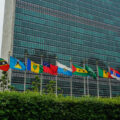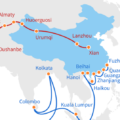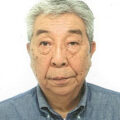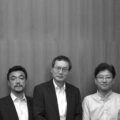Mao Zedong, Chiang Kai-shek, Xi Jinping… A Chinese system that creates “emperors”
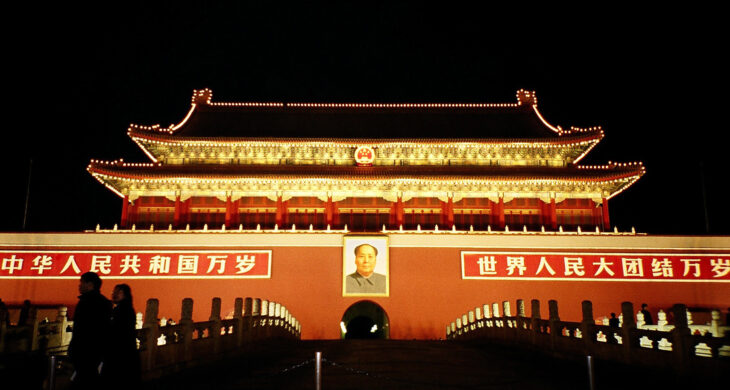
“Why are there leaders who behave like ‘emperors’ in modern China? This is not limited to Xi Jinping in the current government. The same goes for Mao Zedong, the founding father of the People’s Republic of China and whose name is recently brought up a lot in comparison with Xi. Wasn’t the Chinese revolution that he led supposed to deny the ‘emperor’ system?”
Okamoto Takashi, Professor, Kyoto Prefectural University
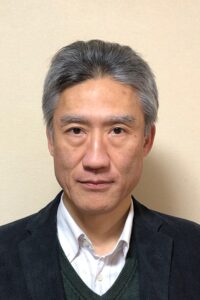
Prof. Okamoto Takashi
China, “emperors,” and “empire”
Regarding China as an “empire” and its supreme leader Xi Jinping as an “emperor” seems to be a common idea in both East and West. A Western magazine I saw a long time ago also used a photo of Xi Jinping wearing a traditional Chinese emperor costume on its cover. The autocrat, meaning the “emperor” of an “empire” who reigns supreme over vast territories, is probably the most obvious image of the modern Chinese leader both in China and abroad.
Of course, Xi Jinping and the other Chinese leaders are not emperors in history. There is no hereditary rule and they have terms of office. Reign and tenure in themselves are not the same. The system is indeed one that was created by denying the earlier imperial system. If we are to rigorously examine its workings, we rather must make a distinction between the individual concrete emperors and the actual imperial system.
Nevertheless, why are there leaders who behave like “emperors” in modern China? This is not limited to Xi Jinping in the current government. The same goes for Mao Zedong, the founding father of the People’s Republic of China and whose name is recently brought up a lot in comparison with Xi. Wasn’t the Chinese revolution that he led supposed to deny the “emperor” system?
Come to think of it, this isn’t just about China. Isn’t Russia a typical example?
President Putin who started the Ukraine war has held supreme power for more than 20 years. It finally has become authoritarian politics. Russia is a descendant of the Roman “Empire” and has borne a typical imperial system in czarism. The Russian Revolution denied that and built a socialistic state called Soviet Union.
So even though Xi Jinping, who is said to be an “emperor,” is not exactly the same as Russian President Vladimir Putin, it should be possible to put them side by side, and this is not limited to the present era. Like Mao Zedong before Xi Jinping, Putin also has a predecessor named Joseph Stalin. In that sense, China and Russia are historically very similar.
The one-party dictatorship and the “empire” system
The “socialist” systems of Russia and China may also be similar contexts. This “socialism” is not general socialism, but Bolshevism, which evolved from Marxism-Leninism, meaning democratic centralism and one-party dictatorship, which tends to develop toward more substantial autocratic rules and power politics. Therefore, Soviet Russia and the People’s Republic of China, which were born from revolutions of the 20th century, have formed systems similar to the previous “emperors.”
Now, in the case of China, this is not an issue with Xi Jinping and Mao Zedong as individuals. Rather, it is an issue of the whole system that compares individuals to “emperors.” There may be a social trend or inclination to accept strong leaders and leadership like that of an “emperor.” Alternatively, the system might not allow the maintenance of order without a tyrannical “emperor.”
Referring to such a whole system in history, we often call it an “empire.” We talk about the Chinese “empire” before the emergence of the “socialistic” state after the Chinese Revolution. For more than 2,000 years, the imperial system was in place and most iterations were authoritarian states. Not only is this similar to the Russian “empire,” but it also existed for a far longer period of time.
As such, it is historically inevitable to think of the People’s Republic of China and Xi Jinping as an “empire” and an “emperor,” and it is better to call this historical continuation. If that is the case, it is necessary to look at the circumstances and background of this situation from a historical perspective.
What does one country, two systems mean?
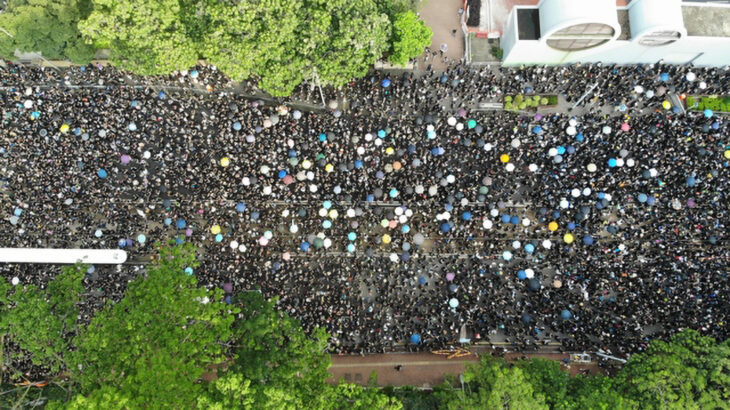
On June 12 2019, 2 million protesters stand out to oppose a controversial extradition bill which may include China.
Photo: Lewis Tse Pui Lung / PIXTA
If we frame the objects that tend to be called “emperor” and “empire” in modern China as issues of a historical system, this is closely related to none other than the so-called “one country, two systems.”
What stands out in Hong Kong-related news articles is the prevalent narrative that “China no longer recognizes ‘one country, two systems’” and that “China is actually crushing ‘one country, two systems’ in Hong Kong.”
There is no doubt that the Chinese government and Hong Kong authorities have altered the status quo. But can we label it as a rejection and destruction of “one country, two systems”?
It is Hong Kong pro-democracy and pro-independence groups and the West that regard the words and actions of government authorities that dismantle the separation of powers and the democratic system in Hong Kong as betraying “one country, two systems.” But China consistently insists that it has acted in accordance with and to retain “one country, two systems.”
In other words, both sides are deepening their confrontation while supporting “one country, two systems.” At first glance, this is an evident contradiction. This appears to be the crux of the matter.
For example, the concept of “independence” often used by Hong Kong pro-democracy groups is a clue. Hong Kong “independence” has become a phrase that criticizes and rejects the authorities’ control and has become popular with the general population. However, no matter how much they shout “independence,” they do not really intend to become a separate country from China. What they have called for is the protection of “one country, two systems” under Article 2 of the Hong Kong Basic Law, which ensures a “high degree of autonomy.” For pro-democracy groups, Hong Kong with a “high degree of autonomy” is basically “independent” as it has a separate system and existence from Mainland China.
This is perhaps why the Hong Kong and Beijing governments have become more vigilant. If “one country, two systems” means “independence” for Hong Kong, then it has the nuance of local authorities and the central government defecting from “China,” which can lead to extremely dangerous ideas and actions. Weren’t such concerns one of the factors that led to the “Hong Kong national security law” in 2020?
In this way, even if we say “one country, two systems,” there have been differences in interpretation and perspective from the beginning. In contrast to pro-democracy groups, who view the existence of a separate system called “two systems” as a vested interest, the logic of the Beijing government is that even if “two systems” have to be tolerated as the status quo, eventually they should move toward “one system” in “one country.” What pro-democracy groups try to express with the word “independence” is “two systems,” which goes against “one country” and is unacceptable to the Beijing government.
“One China” and the “ethnic minority” issue
It’s not just Hong Kong. “One country, two systems” was originally a method devised by Mainland China to unify with Taiwan. Seeing the fate of Hong Kong, Taiwan has no reason to accommodate that. Taiwan does not openly say “independence” like Hong Kong, but it is also a clearly separate entity from the Mainland even when compared to Hong Kong, where “two systems” has been guaranteed. Still, making Taiwan “one country” and “one China” is the aspiration and “dream” of the government of the Mainland, while being nothing but a “nightmare” for the status quo in Taiwan.
This situation also applies to Tibet, a Chinese “ethnic minority” and “autonomous region.” The problem is not limited to Hong Kong and Taiwan. This is why “one country, two systems” is directly linked to “One China” and expands.
Tibet’s supreme leader, the 14th Dalai Lama, fled to India in 1959. He has not returned to Tibet since. This is because he cannot accept China’s actions, demanding not autonomy for the “autonomous region” but a “high degree of autonomy.” Tibetans are also frustrated that they have been denied their own religion, folkways, and customs as an “ethnic minority,” frequently prompting them to have “riots” and resist the Chinese government. The Beijing government has repeatedly cracked down on such actions. This is because the words and deeds of the 14th Dalai Lama and Tibetans imply a rejection of “One China,” of which the “autonomous regions” are a part, and of Zhonghua minzu (Chinese nation), which includes “ethnic minorities.” For the central government, there is no option to opt for “independence” separate from “China” and “Zhonghua” [means center of the world].
The recent repression of Muslim residents in the Xinjiang Uygur Autonomous Region, although using different forms and methods, has the same motivation and logic. The West and we used to criticize this as an “ethnic problem” and now as “human rights violations.” Yet for China, this is a phenomenon that is a necessary part of the advocation of “One China” and “Zhonghua minzu” that has taken place since the start of the 20th century.
The concept of Zhonghua
So what are “One China” and Zhonghua minzu? Both are keywords from the Xi Jinping administration.
Both “Zhongguo” and “Zhonghua” are Hanyu (Chinese) words, meaning China now, that have existed since ancient times, and the two are almost synonymous. Because they signify the center of the world and civilization, they are honorific appellations of the only supreme and the incomparable, but they have not always been proper nouns. People who use Hanyu have used them for self-aggrandizement.
During the era of the Chinese empire, each dynastic government that rose and fell called itself “Zhonghua” and, to a greater or lesser extent, was an “empire” that contains ethnic groups with different languages and folkways. As is well known, the first “emperor” in Chinese history was Qin Shi Huang (the First Emperor of Qin) in the 3rd century BC. He annexed the other six kingdoms and unified All-under-Heaven. In other words, until then, separate countries had been standing side by side, each separate from the others. Qin’s unification lasted only 15 years, while the Han dynasty that succeeded it maintained peace while respecting the individuality of each region, finally creating the “empire” format.
After the Age of the “Three Kingdoms” in the 3rd century, the Chinese empire was still divided and in turmoil, largely divided into north and south. Although the Sui Dynasty and the Tang Dynasty finally achieved unification in the 7th century, if we look closely at their interiors, they actually had deeper pluralistic and multiethnic compositions.
The majority of the inhabitants in Mainland China were, of course, Han Chinese using Hanyu. But the Sui and Tang Dynasties as well as the later Mongol Empire and Qing Dynasty, which are familiar to Japan in Japanese history, were dynasties with non-Han governments. The Han administration leaned toward an ideology for Hanyu and somewhat neglected other ethnic groups, so the expansion and maintenance of “empire” frequently ran into trouble. Non-Han administrations found it easier to rule in ways that accounted for multiethnic co-existence and that could realize vast territories.
An “empire” is a “multidimensional society”
The “Zhonghua” center functioned as a system to bring together a diverse and decentralized population. It is precisely because of this unique center that the overall order could be maintained as a multidimensional society, and this arrangement not only applies to historical China but more or less also to the so-called world empires of the past.
However, as the nation-states of Western Europe grew stronger and their ideas and institutions were imported, “empires” that encompass a wide variety of peoples without exception had to become “one nation, one ethnic group (nation)” systems. In the case of Mainland China, the only way to make such a shift was to put the concepts of “Zhongguo” and “Zhonghua minzu” at the center. Just as “Zhonghua,” i.e., the center of the world can only be “one,” the nation-state named “Zhongguo” that succeeded the “empire” and thereafter meant China, also can only be “one.” This is because “One China” and one “Zhonghua minzu” became the framework for the nation-state.
However, the previous “empire” was a multidimensional society, and the groups that made up the successor “China” were very decentralized and extremely diverse. It was very far from “One (China).” It was precisely because of the persistence of this situation that “two systems” and “autonomous regions” were necessary. This lack of “One (China)” made it necessary to become “one country” with “two systems.” It is a mechanism of friction that arises because of “one country, two systems.”
Whether it’s Xi Jinping or Putin, they may see themselves as at least trying to unify their peoples and their nations. The problem is that this makes them look like autocracies, and “emperor” to the outside world and mainly in the West. It is true that they have little regard for people’s sentiments, and there is no doubt that they do not go well with democracy. However, according to the people concerned, if we consider each and every one of the pluralistic and disparate groups as well as people’s sentiments, it will be impossible to establish a nation-state, which is their goal.
It’s not just the leaders of today. In modern Chinese history, both the Chinese Nationalist Party (Kuomintang) and the Chinese Communist Party, both of which are supposed to have been modern party organizations, had no choice but to opt for authoritarian control through the adoption of a “party-state system” system and democratic centralism that is the closest we get to the “imperial system” of the past. This may seem contradictory to their goals and slogans of “anti-imperialism.” Still, judging from the circumstances described above, these were also performances faithful to history. No wonder autocratic leaders like Chiang Kai-shek and Mao Zedong were born.
What is “universal value”?
As such, China is an ancient “empire” that developed and has sustained an “emperor” system to administer its multidimensional society. On top of that, they are currently seeking to build a nation-state, causing friction in various directions. This is why China behaving like a hegemonic “empire” and Xi Jinping being considered an authoritarian “emperor” can be seen as historical products.
However, Western countries and Japan do not always seem to fully understand this situation. When it comes to authoritarian “emperors” and hegemonic “empires,” the narrative tends to be that they contradict basic human rights, democracy, the international order, and anti-imperialism.
Basic human rights, democracy or nation-state, and the international order can only be established if certain criteria are fulfilled. Typically, you need a geographically cohesive country of a certain size and inhabitants with homogeneous languages and folkways, yet looking at the world today, there are not many countries that meet such requirements. Moreover, none have existed more than a few hundred years at most. They are quite new phenomena. We often call them “universal values,” but they are not so “universal” from a historical perspective.
In the 19th and 20th centuries, such nation-states realized imperialism and conquered the world, so that the nation-state and the international order became the world standard for now. Against this backdrop, China also transformed from an “empire” to a nation-state. As mentioned above, the Xi Jinping administration has demonstrated this to date. A well-known result of this is that the existing order has been shaken in recent years.
Viewing China from Japan, a country that cannot become an “empire”
What about Japan? Japan also aimed to become a nation-state through the Meiji Restoration. Meiji Japan achieved this goal relatively quickly, unlike China. This is entirely because the Japanese archipelago happened to meet the requirements of a nation-state.
Japan also has no experience with the so-called “empire” system in history. It was a backward country far from the continent. At the same time, it also means that it has not historically had the know-how about multidimensional society and how to administer groups in an integrated manner. Modern Japan followed the Western powers and became a nation-state before pushing forward with imperialism. As is well known, we fought a war to become an “empire” and destroyed ourselves. For Japan, although being a nation-state might work, being an “empire” apparently wasn’t our thing in ancient as well as modern times. On the other hand, while China has historically been an “empire,” it has been aiming to become a nation-state by advocating “anti-imperialism,” still pursuing that “dream.” It is by no means easy for the Japanese to understand this China.
Seen from this perspective, the Japanese need to re-examine their view on China. Japan and China are neighbors separated by “a strip of water,” ethnically close, and use the same Chinese characters, so we have the potential to understand each other. The preconceived notions and latent awareness of Japan and China being of “the same script and same kind” are quite deep-rooted among Japanese people.
This awareness became the foundation of the friendship between Japan and China in the 1970s and 1980s. Of course, that friendship is all but gone now, and Japan is almost exclusively colored by “anti-Chinese sentiment” in recent times. However, things do not seem to have changed at the core, and I feel like we dislike China on the basis of thinking that we understand it. I suspect a simplistic awareness of being “the same script and same kind” is at work there.
Illusions of “a strip of water” and “the same script and same kind”
No matter how close we may think we are, with only “a strip of water” between us, Japan and China are separated by the vast East China Sea. In Western Europe, the Straits of Dover are all that separate the neighbors Britain and France, who became nation-states together and understand each other with ease. This relationship is incomparable to that between Japan and China. It is rather natural that Japan and China, which are far more distant from each other than Britain and France and whose origins are different, cannot understand each other.
But the world doesn’t necessarily think so. Quite a few have compared the Anglo-French relationship to that of Japan and China. Britain is undoubtedly part of Europe. In terms of language and culture, English and French are very close. Britain nonetheless decided to go through with Brexit, setting itself apart from Europe and the continent. This reflects their self-consciousness of being foreign.
If that is the case, wouldn’t it be a gross mistake to assume that the Japan on the edge of the same [Eurasian] continent is also part of Asia, and that it is close to and can easily understand China? The same goes for the languages as Japanese and Chinese are completely different, with it being extremely difficult to master either. It is a coincidence that we share a script because the Japanese people did not have their own characters, only borrowed Chinese characters. Therefore, we have little in common in terms of ways of thinking and principles of action. This is also reflected in our national systems.
In this way, Japan and China have nothing in common as far as our mentalities go from the beginning.
It is historically more accurate to think that we are incompatible, that we don’t understand each other, and that we now dislike China without understanding it.
China has now become a major power that can “rival” the United States. At the same time, it is an abnormal great power that is regarded as an “empire” ruled by an “emperor.” We can’t distance ourselves from this neighbor, so we have no choice but to get along. I would like to believe that learning from history and rethinking China, “empire,” and “emperors” can be a help in this regard.
Translated from “Mo Takuto, Sho Kaiseki, Shu Kinpei … ‘Kotei’ wo Umidasu Chugoku no shisutemu (Mao Zedong, Chiang Kai-shek, Xi Jinping… A Chinese system that creates “emperors”),” Chuokoron, July 2022, pp. 44–51. (Courtesy of Chuo Koron Shinsha) [August 2022]
Keywords
- Okamoto Takashi
- Kyoto Prefectural University
- Mao Zedong
- Chiang Kai-shek
- Xi Jinping
- China
- supreme leader
- autocrat
- emperor
- empire
- East
- West
- Russia
- Vladimir Putin
- Roman Empire
- Hong Kong
- Taiwan
- one country, two systems
- One China
- ethnic minorities
- Zhonghua minzu
- language
- nation-state
